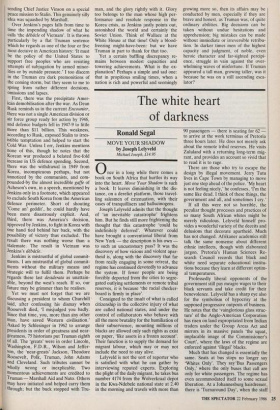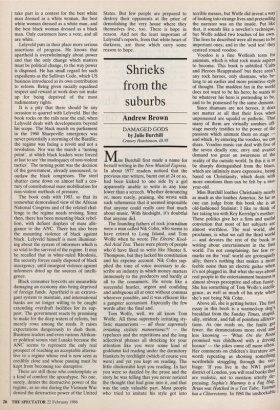The white heart of darkness
Ronald Segal
MOVE YOUR SHADOW by Joseph Lelyveld
Michael Joseph, £14.95
0 nce in a long while there comes a book on South Africa that hurtles its way into the heart. Move Your Shadow is such a book. It leaves diminishing in the dis- tance, on a derelict platform, those travel- ling salesmen of extenuation, with their cases of tranquillisers and hallucinogens.
Joseph Lelyveld admits that the thought of 'an inevitable catastrophe' frightens him. But he finds still more frightening the thought that this catastrophe 'could be indefinitely deferred'. Whatever could have brought a conventional liberal from New York — the description is his own to such an uncustomary pass? It was the discovery of how vicious and violent apar- theid is, along with the discovery that far from really engaging in some retreat, the regime has continued devotedly to advance the system. If fewer people are being forcibly deported from the cities to segre- gated outlying settlements or remote tribal reserves, it is because 'the racial checker- board is firmly in place'.
Consigned to the insult of what is called citizenship in the collective injury of what are called national states, and under the control of collaborators who behave with all the more brutality for the humiliation of their subservience, mounting millions of blacks are allowed only such rights as exist on paper, 'like assets in a frozen account'. Their function is to supply the demand for migrant labour, which may or may not include the need to stay alive.
Lelyveld is not the sort of reporter who is satisfied with what he can gather by interviewing reputed experts. Exploring the plight of the daily migrant, he takes bus number 4174 from the Wolverkraal depot in the Kwa-Ndebele national state at 2.40 in the morning and travels with more than 90 passengers — there is seating for 62 to arrive at the work terminus of Pretoria three hours later. He does not merely ask about the remote tribal reserves. He visits Zululand with a returning long-term mig- rant, and provides an account so vivid that to read it is to rage.
There are those who try to escape the design by illegal movement. Jerry Tutu lives in Cape Town by managing to move just one step ahead of the police. 'My heart is not feeling nicely,' he confesses, 'I'm the same like dead. I think of these things, the government and all, and sometimes I cry.'
If all this were not so horrible, the peculiar thought processes and practices of so many South African whites might be merely ridiculous. Lelyveld himself pro- vides a wonderful variety of the deceits and delusions that decorate apartheid. Much has not changed. Afrikaner academics still talk the same nonsense about different ethnic intellects, though with elaborated jargon. Pretoria's Human Sciences Re- search Council records that black and white need separate educational institu- tions because they learn at different optim- al temperatures.
Professedly liberal opponents of the government still pay meagre wages to their black servants and take credit for their benevolence. Lelyveld has a sharp eye also for the symbolism of hypocrisy at the supposed progressive outposts of business.
He notes that the 'vainglorious glass struc- ture' of the Anglo-American Corporation has risen on land expropriated from Indian traders under the Group Areas Act and mirrors in its massive panels 'the squat, implacable image of the Commissioner's Court', where the laws of the regime are enforced against 'illegal' blacks.
Much that has changed is essentially the same. Seats at bus stops no longer say `Whites Only'. They say 'Bus Passengers Only,' where the only buses that call are only for white passengers. The regime has even accommodated itself to some sexual liberation. At a Johannesburg hairdresser, there is 'Turnaround Day', when the staff take part in a contest for the best white man dressed as a white woman, the best white woman dressed as a white man, and the best black woman dressed as a black man. Only customers have a vote; and all are white.
Lelyveld puts in their place more serious assertions of progress. He knows that apartheid is overwhelmingly about power and that the only change which matters must be political change, to the way power is disposed. He has small regard for such expedients as the Sullivan Code, which US business introduced as its own contribution to reform. Being given racially equalised respect and reward at work does not make up for being deprived of the most rudimentary rights.
It is a pity that there should be any occasion to quarrel with Lelyveld. But the book rocks on the rails near the end, when Lelyveld deals with developments beyond his scope. The black march on parliament in the 1960 Sharpeville emergency was never potentially a storming of the Bastille; the regime was facing a revolt and not a revolution. Nor was the march a 'turning point', at which black leaders were forced at last to see 'the inadequacy of non-violent tactics'. The turning point was the decision of the government, already announced, to outlaw the black congresses. The steel shutter came down on almost half a cen- tury of constitutional mass mobilisation for non-violent methods of pressure.
The book ends with 1983, so that its somewhat demoralised view of the African National Congress and of the related chal- lenge to the regime needs revising. Since then, there has been mounting black rebel- lion, with defiant displays of mass alle- giance to the ANC. There has also been the mounting violence of black against black. Lelyveld himself is most illuminat- ing about the system of informers which is so vital to the survival of the regime. It may be recalled that in white-ruled Rhodesia, the security forces easily disposed of black insurgency, until insurgent violence against informers dried up the sources of intelli- gence.
Black consumer boycotts are meanwhile damaging an economy also being deprived of foreign funds. Apartheid is an extrava- gant system to maintain, and international banks are no longer willing to be caught extending overdraft facilities for its sup- port. The government reacts by promising to make for the deep waters of reform, but merely rows among the reeds. It raises expectations dangerously to dash them. Business leaders and even various Afrikan- er political scouts visit Lusaka because the ANC seems to represent the only real prospect of reaching an acceptable alterna- tive to a regime whose end is now seen as credibly close and whose passing must be kept from becoming too disruptive.
There are still those who contemplate as a kind of comfort the apocalypse. No one, surely, denies the destructive power of the regime, as no one during the Vietnam War denied the destructive power of the United States. But few people are prepared to destroy their opponents at the price of demolishing the very house where they themselves live, too. There is hope in reason. And not the least important of Lelyveld's reports, from that white heart of darkness, are those which carry some reason to hope.















































 Previous page
Previous page